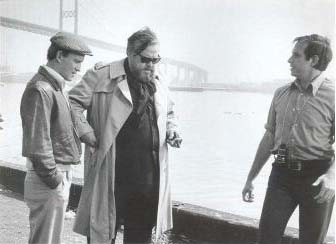"I CONSIDER THOSE MY TWO OSCARS"
 La Repubblica's Mario Serenellini posted an interview yesterday with Brian De Palma, which appears to have been conducted at this past summer's Montreal World Film Festival. Here are some highlights, with help from Google translation:
La Repubblica's Mario Serenellini posted an interview yesterday with Brian De Palma, which appears to have been conducted at this past summer's Montreal World Film Festival. Here are some highlights, with help from Google translation:ON NEW TECHNOLOGIES
"It's a fever that I got as a kid from my older brother Bruce, who died in '97, family pride for scientific acumen. In high school I emulated him: I won a contest with the study on 'The application of cybernetics to differential equations' and with him I made the primordial computer. For me, smartphones are the most important recent inventions, because they deeply change your life. So I made it the engine in Passion, its key metaphor."
ON REMAKES & 'TREASURE OF THE SIERRA MADRE'
"I like to get my hands on films that have already been made, characters already defined, because there is always something you can add, remove, update. My big dream is a version of Treasure of the Sierra Madre by John Huston, with characters not rewarded by a gold mine, but cocaine, the gold of our time. The idea surfaced with Scarface, which was just back in theaters, restored : the remake of Howard Hawks, which I made thirty years ago with star Al Pacino. I was prompted by the prospect of placing myself in the Cuban community in Florida and within that universe of cocaine, which is harvested in the mountains at no cost, but once arrived in the city, is worth millions, and the foolish way the smugglers are unable to abstain."
ON WORKING WITH ORSON WELLES AND BERNARD HERRMANN
"I consider those my two Oscars, of which I've never even received a nomination. At thirty-two years old I made Get To Know Your Rabbit with the great Welles, a terrific actor, a great talker, a brilliant director who in 1940, the year of my birth, made the best movie ever filmed, Citizen Kane. I was excited and worried about him: in debt, discarded by Hollywood, he agreed to shoot for a couple of weeks to collect a bit of money for his next film. My other stroke of luck, the year after, the soundtrack for Sisters was composed by Herrmann, the wizard behind the music from Psycho, Vertigo, North by Northwest. I never saw his face: he always kept his head down when he spoke. A volcano of sudden rages, his reaction to bad decisions. Much like Welles. The difference? Herrmann maintained his wrath through to the end of the objective, while Welles, after the first outburst, would give in. He was unshakable in the face of the new industry requirement to write at least one ‘successful’ film song - like 'Mrs. Robinson' from The Graduate or 'The Ballad of Easy Rider' - imposed since the sixties because of the dominance of the music industry on film. Herrmann was categorical: 'I do not write songs but film music!' He left the U.S. for London, where he set to music two Truffaut films: Fahrenheit 451 and The Bride Wore Black"
ON BEING AN 'ECONOMIC REFUGEE' FROM HOLLYWOOD
When asked if he considers himself an exile in Hollywood, De Palma replies, "No, rather an economic refugee. I moved there early in my career to raise dollars, now I’m learning the lesson of [Woody] Allen: 'Take the money and run.' Hollywood is a disease that is too contagious: you stay there one more minute and you find yourself shooting the next Schwarzenegger film without even knowing how it happened."
ON 'HAPPY VALLEY'
"It’s inspired by a true story, that shook the United States: that of Joe Paterno, model coach of a university football team overwhelmed by a pedophilia scandal that destroyed his forty year career, leading to his death two years ago. It is the descent into hell of a man whose past was exemplary: a fascinating story, worthy of Ibsen or Arthur Miller. It could breathe fresh air into Hollywood today, which is busy squandering millions on big screen comic books, toys and a new set of Batman. When I finished Mission to Mars, I said to myself: 'You spent a hundred million dollars: pulverized in Space. But what's the point?' This is the question that chases me when, in order to test the absurd, I shove my nose into the blockbuster of the moment: are there really people who buy tickets to see this stuff?"



